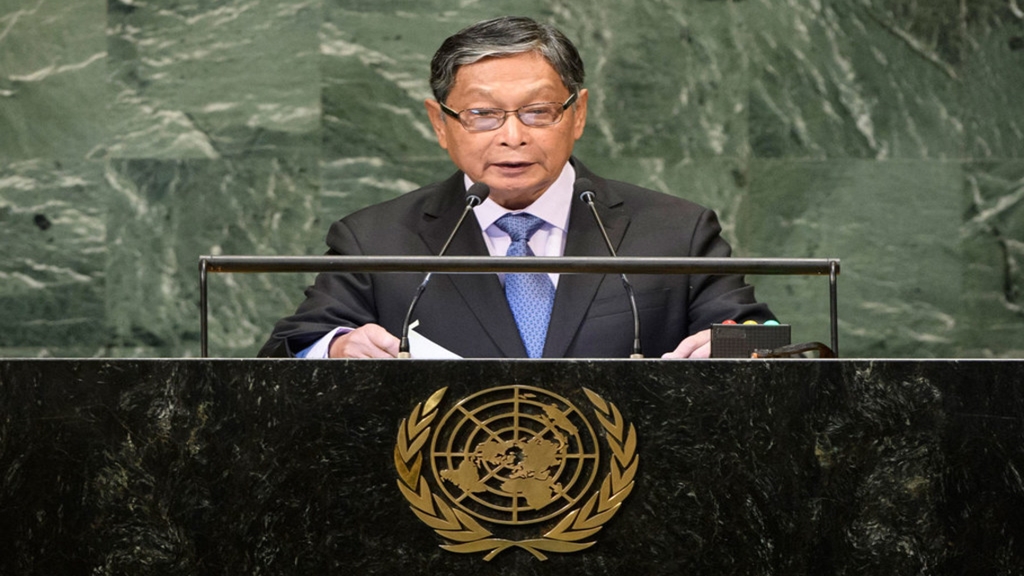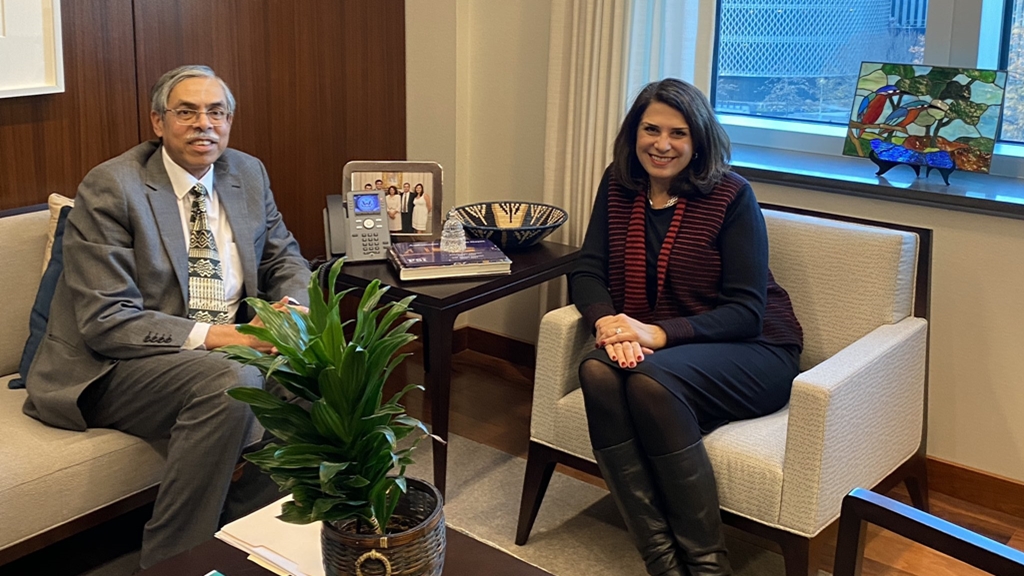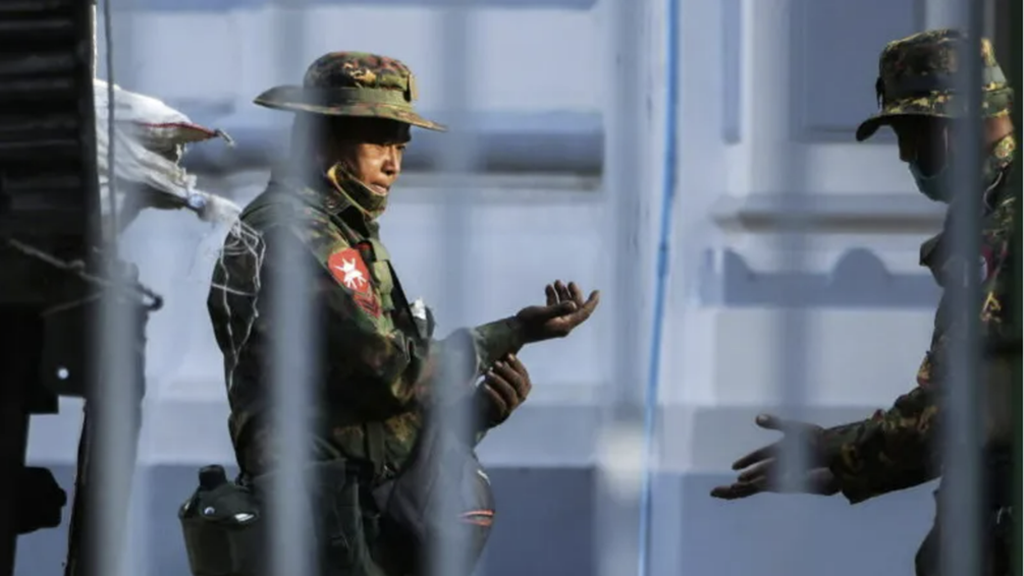
Minister Kyaw Tint Swe Lied at the UNGA
- 02/10/2019
- 0
By Aman Ullah
On September 28, 2019 the fifth day of debate in the 74th General Assembly of United Nations, Kyaw Tint Swe, Myanmar’s Union Minister for the Office of the State Counsellor said that Myanmar willing to repatriate ‘verified returnees’ from Bangladesh.
He said repatriations would be carried out in line with a November 2017 agreement with Bangladesh and creates a more conducive environment for verified returnees. As per him displaced people who had been living in Rakhine state “have a different legal status.”
Those who qualify for citizenship will be issued with citizenship cards. The rest will receive National Verification Cards which he likened to the “green card” issued to immigrants in the United States.
Burma gained his independence on 4 January 1948 by the implementation of the Article 73 of the United Nations` Charter. After gaining his independence, Myanmar applied on 27 February 1948 to the membership of the United Nations. In the first paragraph of the letter, U So Nyun, the then ambassador of Burma wrote that: “By an Act passed by the Parliament of the United Kingdom, Sovereignty over Burma passed from the British Crown to the Burmese people on 4th January, 1948, since when Burma has been a sovereign Independent Republic”
The Act passed by the Parliament of the United Kingdom as written in the letter given by the Ambassador U Son Nyun, is the Burma Independence Act 1947 to Provide for the independence of Burma. The British parliament approved the Burma Independence Act on December 10, 1947. The Burma Independence Act is the appropriate legislation of the United Kingdom Parliament for the Independence of Myanmar as indicated in the Article 15 of the Agreement between the Government of the United Kingdom and the Provisional Government of Burma, the Burma Independence Agreement (known as the Nu-Atlee Agreement).
According to the Clause 2 subsection (1) of the Burma Independence Act, 1947, “Subject to the provisions of this section, the persons specified in the First Schedule to this Act, being British subjects immediately before the appointed day, shall on that day cease to be British subjects:”Under the clause 1 subsection (2) of that Act, “the appointed day” means the fourth day of January, nineteen hundred and forty-eight.
As par the Clause 1 subsection (a) of schedules First Schedule, ‘persons who were born in Burma or whose father or paternal grandfather was born in Burma will lose their British Nationality after Burma has become independent.’ That’s means that, then they will no more to be subjects of Her Majesty Queen Victoria and will become independent citizens of independent Burma.
On 17 October 1947, Prime Ministers, U Nu of Burma and Clement Attlee of the UK signed a treaty formally for the recognizing the independence of the Union of Burma, “Treaty between the Government of the United Kingdom and the Provisional Government of Burma”, known as the Nu-Atlee Agreement within the UN Charter on the principle of decolonization. In Article 1 of the Nu-Atlee Agreement, the Government of the United Kingdom recognizes the Republic of the Union of Burma as a fully Independent Sovereign State.
The Nu-Atlee Agreement was very important as to the determination of the nationality status of the peoples and races in Burma. In the Article 3 of the Nu-Atlee Agreement, a citizen of Burma (Myanmar) defined:
“Any person who at the date of the coming into force of the present Treaty is, by virtue of the Constitution of the Union of Burma, a citizen thereof and who is, or by virtue of a subsequent election is deemed to be, also a British subject, may make a declaration of alienage in the manner prescribed by the law of the Union, and thereupon shall cease to be a citizen of the Union. The Provisional Government of Burma undertake to introduce in the Parliament of the Union as early as possible, and in any case within a period of one year from the coming into force of the present Treaty, legislation for the purpose of implementing the provisions of this Article.”
Before the independence of Burma, all the peoples including the minorities were under the protection of the Article 73 of the United Nations` Charter by the General Assembly Resolution66 (I). In Article 73, the interests of the inhabitants of the territories whose peoples have not yet attained a full measure of self-government as a principle defined as “paramount”, this principle includes “the well-being of them.”
The object and purpose of the Nu-Atlee Agreement are decolonizing all the peoples living in Burma (Myanmar) and make them citizens of the newly independent State and there is no room left for denationalization of these peoples through the modification of the Article 3 of Nu- Atlee Agreement.
The Constitution for this sovereign Independent Republic was completed on 24 September 1947 and following approval by the British parliament and signing of defense agreement, Burma became free on 4 January 1948. The people of Burma ceased the subjects of British and became independent citizens of independent country.
The 1947 Constitution provided safeguards for fundamental rights. Under this Constitution the people of Burma irrespective of “birth, religion, sex, or race” equally enjoyed all the citizenship rights including the right to express, right to assemble, right to association and unions, settle in any part of the Union, to acquire property and to follow any occupation, trade, business or profession.
The Section 10 of the 1947 Constitution of the Union of Burma also states: “There shall be but, only one citizenship throughout the Union; that is to say, there shall be no citizenship of the unit as distinct from the citizenship of the Union.”
Under Section 11 of the Constitution of the Union of Burma (1947), as shown below,
(i) every person, both of whose parents belong or belonged to any of the indigenous races of Burma;
(ii) every person born in any of the territories included within the Union, at least one of whose grand-parents belong or belonged to any of the indigenous races of Burma;
(iii) every person born in any of territories included within the Union, of parents both of whom are, or if they had been alive at the commencement of this Constitution would have been, citizens of the Union;
(iv) every person who was born in any of the territories which at the time of his birth was included within His Britannic Majesty’s dominions and who has resided in any of the territories included within the Union for a period of not less than eight years in the ten years immediately preceding the date of the commencement of this Constitution or immediately preceding the 1st January 1942 and who intends to reside permanently there in and who signifies his election of citizenship of the Union in the manner and within the time prescribed by law, shall be a citizen of the Union.
These are the fundamental rights of a citizen according to the Constitution of Union of Burma, 1947.
According to the Mr. Sultan Ahmed, the then a member of the Constituent Assembly, ‘When section II of the Constitution of the Union of Burma was being framed, a doubt as to whether the Muslims of North Arakan fell under the section sub-clauses (1) (II) and (III), arose and in effect an objection was put in to have the doubt cleared in respect of the term “Indigenous” as used in the constitution, but it was withdrawn on the understanding and assurance of the President of the constituent Assembly, at present His Excellency the President of the Union of Burma, who when approached for clarification with this question, said, “Muslims of Arakan certainly belong to one of the indigenous races of Burma which you represent. In fact there is no pure indigenous race in Burma, and that if you do not belong to indigenous races of Burma, we also cannot be taken an indigenous races of Burma.” Being satisfied with his kind explanation, the objection put in was withdrawn.
Being one of the indigenous races and bona fides citizens of Burma, the Rohingyas were enfranchised in all the national and local elections of Burma except 2015 election under all the constitutions of Burma:- under the Government of Burma Act 1935, under the Constitution of Union of Burma 1947, Under the Constitution of Socialist Republic of Union of Burma 1974, under the Constitution of the Republic of Union of Myanmar 2008.
The first election held under the Government of Burma Act 1935 that took place in November 1936. The Government of Burma Act, 1935 was prescribed in the nature of a Constitution and it may be considered to be the first Constitution of Burma. The Rohingya Muslims of Akyab district North constituency, a non-communal rural constituency, were recognize as eligible to vote or to stand for election. Mr. Ghani Markin returned on the votes of those Rohingyas as a Member of Legislative Assembly.
The second election was held under the under the Government of Burma Act 1935 in accordance with Aung San-Atlee Agreement that was signed on 27 January 1947. Mr. Sultan Ahmed and Mr. Abdul Gaffar returned on the votes of this Muslims as members of the constituent Assembly. They continued in their office, representing the Akyab district North constituency till Burmese independence and took the oath of allegiance to the Union of Burma on the 4th January 1948 as members of the new parliament of the Union of Burma.
Since the holding of the constituent Assembly till 1962 military took over, three general elections were held for both Chambers of the Parliament in 1952, 1956 and 1960 respectively, under the Constitution of Union of Burma 1947. As bona fides citizens of Burma the Rohingyas had enjoyed the right to vote and the right to be elected in all the elections.
• In 1952, Mr. Sultan Ahmed, Daw Aye Nyunt (a) Zohora Begam, Mr. Abul Bashar and U Poe Khine (a) Nasir Uddin were elected as members of the Chamber of Deputies and Mr. Abdul Gaffer was elected as a member of the Chamber of Nationalities.
• In 1956, Mr. Sultan Ahmed, Mr. Abul Khair, Mr. Abul Bahsar and Mr. Ezahar Mian were elected as the members of the Chamber of Deputies and Mr. Abdul Gaffer remained as a member of the Chamber of Nationalities. A by-election was held for the Buthidaung North Constituency in 1957 as the election of Mr. Ezahar Main was challenged and the verdict was given against him. Mr. Sultan Mahmood was elected and he was inducted in the cabinet of U Nu as a Minister of Health.
• In 1960, Mr. Rashid Ahmed, Mr. Abul Khair, Mr. Abul Bahsar and Mr. Sultan Mahmood were elected as members of the Chamber of Deputies while Mr. Abdus Suban was elected as a member of the Chamber of Nationalities.
During the Burma Socialist Programme Party (BSPP) regime, four general elections for the People’s assembly and People’s Council at different levels were held in 1974, 1978, 1982 and 1986 respectively. These elections had been held on the basis of the 1974 Constitution.
The Rohingyas had enjoyed the right to vote and the right to be elected as people’s representatives to the Organ of State power at different levels. Although, former Minister for Mines Dr. Nyi Nyi and Deputy Minister for Foreign Affairs Minister U Win Ko had to resign from the position of the members of cabinet and People’s Assembly, as they could not fulfill the requirement of the said law, no Rohingya who had either been elected or who had applied for the nomination had neither been challenged nor barred from participation or asked to resign after being elected.
SLORC held multi-party general election in May 1990 in according to the 1982 Burmese Citizenship Law. The Rohingya were not only allowed to vote but also, in their exercise of franchise, elected four Rohingya members of Parliament. U Chit Lwin (a) Ebrahim, Mr. Fazal Ahmed, U Kyaw Min (a) Shomshul Anwarul Haque, and U Tin Maung (a) Nur Ahmed have been elected as members of the Parliament.
A general election was held in Burma (Myanmar) on 7 November 2010, in accordance with the 2008 Constitution of Myanmar. Among 33 Rohingya who contested in that poll, U Htay Win (a) Zahidur Rahman with USDP ticket was elected for the Nationalities Parliament. U Aung Zaw Win (a) Zakir Ahmed and U Shwe Maung (a) Abdul Razak both with USDP tickets were elected for the People’s Parliament. U Aung Myo Myint (a) Jahan Gir with USDP ticket, U Aung Myint (a) Zahiddullah and U Bashir Ahmed both with NDPD tickets were elected for the State Parliament. The Rohingyas of North Arakan were overwhelmingly gone to vote with average turnover of more than 90%.
Thus, under all the constitutions of Burma since 1935 including existing 2008 constitution these Rohingyas of Arakan are not only bone fide citizens of Burma/ Myanmar but also eligible for their right to franchisees.
Hence, the citizenship issue of the Rohingya was a settled issue and the about one million Rohingya Refugees who are taking refuge in Bangladesh have no different legal status. Without any doubt, they all are bona fides citizens of Myanmar.
Kyaw Tint Swe the Myanmar’s Union Minister is lying on UN General Assembly stage not only about their legal status but also about the National Verification Cards. He compares that the National Verification Cards (NVC) is like to the “green cards” issued to immigrants in the United States. US green card is issued to the foreigners to nationalize them, while NVC is issued to their own citizens to denationalize them.







